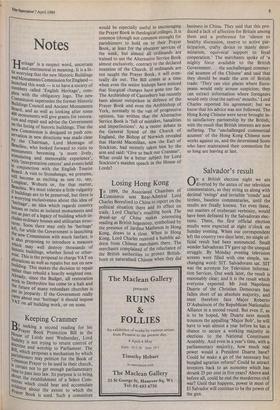Salvador's result O n a British election night we are diverted
by the antics of our television commentators, as they string us along with decimal `swings' and invisible `trends' and tireless, baseless commentaries, until the results are finally known. Yet even these, our masters of exuberant verbosity, would have been defeated by the Salvadoran elec- tions. There, the first official election results were expected at eight o'clock on Sunday evening. When our correspondent left the country two days later, no single of- ficial result had been announced. Small wonder Salvadoran TV gave up the unequal struggle. By Monday evening television screens were filled with one simple, un- changing word: SIT. Salvadorans sat. SIT was the acronym for Television Informa- tion Services. One week later, the result is reasonably clear; and it is the result which everyone expected. Mr Jose Napoleon Duarte of the Christian Democrats has fallen short of an absolute majority, and must therefore face Major Roberto D'Aubuisson of the Republican Nationalist Alliance in a second round. But even if, as is to be hoped, Mr Duarte next month trounces the appalling 'Major Bob', he will have to wait almost a year before he has a chance to secure a working majority in elections to the National Constituent Assembly. And even in a year's time, with a parliamentary majority, how much real power would a President Duarte have? Could he make a go of the necessary but bungled agrarian reform? Could he attract investors back to an economy which has shrunk 25 per cent in five years? Above and before all, could he end the murderous civil war? Until that happens, power in most of El Salvador will continue to be the power of the gun.










































 Previous page
Previous page